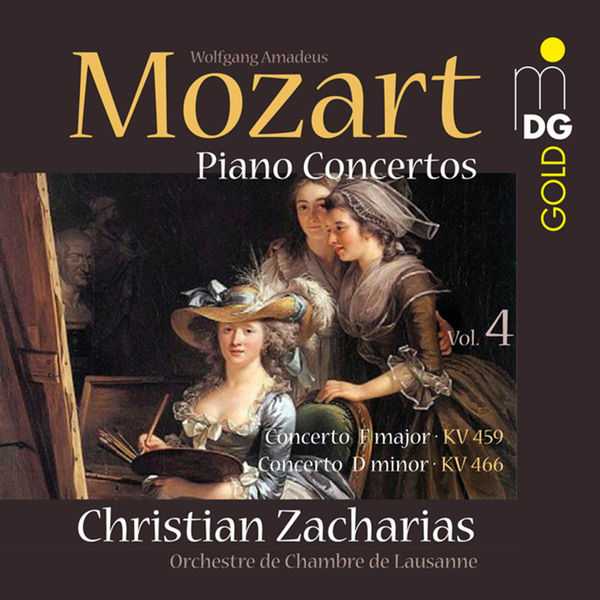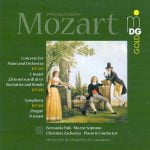
Composer: Wolfgang Amadeus Mozart
Performer: Christian Zacharias
Orchestra: Orchestre de Chambre de Lausanne
Conductor: Christian Zacharias
Format: FLAC (tracks)
Label: MDG
Release: 2008
Size: 195 MB
Recovery: +3%
Scan: cover
Piano Concerto in F Major, K. 459
01. I. Allegro
02. II. Allegretto
03. III. Allegro assai
Piano Concerto in D Minor, K. 466
04. I. Allegro
05. II. Romanze
06. III. Allegro assai
This disc is part of a Mozart concerto cycle being issued by German pianist Christian Zacharias, conducting the Chamber Orchestra of Lausanne. Several of the discs have been exceptional, and the musicianship here maintains the high level of the earlier releases in the series. The interpretations, however, are a bit unorthodox, so sample well and consider. The audiophile sound from the MDG label continues to be an attraction in itself; the sonics of Lausanne’s moderate-sized and heavily acoustically tweaked Salle Métropole concert hall have awesome clarity and depth. The contrast between MDG’s approach — it seeks out halls that are musically and historically appropriate — and those of engineers who simply choose the most acoustically live church in the immediate area could not be clearer and could not reflect better on this small German label. Zacharias has favored a liquid but clean sound with very little pedal, generally quite restrained but leaving room for little outbursts of expression as a movement coalesces into formal clarity. In these two sharply contrasting concertos, he may be too restrained for some listeners. The Piano Concerto No. 19 in F major, K. 459, following a long Austrian tradition going back through such pianists as Ingrid Haebler, often has an ebullient pastoralism, with plenty of vigor in its marchlike opening (suggested perhaps by Mozart’s notation that the work featured trumpet and drum parts, perhaps lost or perhaps never written in the first place) and an emphasis on the polyphony that playfully rises out of the light thematic material in the finale. Far from having the (modern grand) piano stand up to the rhythmic vitality, Zacharias tamps everything down. The result is a very subtly humorous treatment that stands out from other recordings on the market but is certainly subject to debate (not least in the added cadenza partway through the finale). The big Piano Concerto in D minor, K. 466, is similar. Zacharias avoids Beethovenian mannerisms, with a rather flat opening of the usually restless opening of the finale. The tension is seemingly transferred to the central Romanze, which he takes at a quick clip and in which he pushes the tempo of the seemingly limpid main theme. Zacharias’ facility with the details of the long Mozartian concerto movement is especially clearly in evidence here: the opening movement builds in every way toward an intense climax. As distinctive as other releases in the series, this one is just a bit less orthodox.



